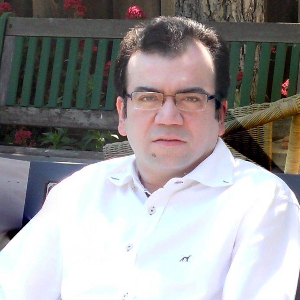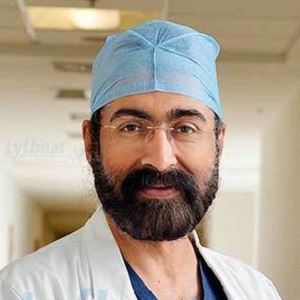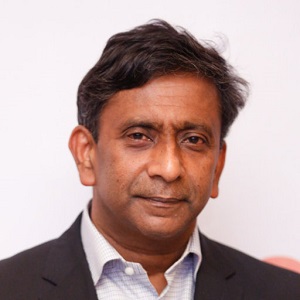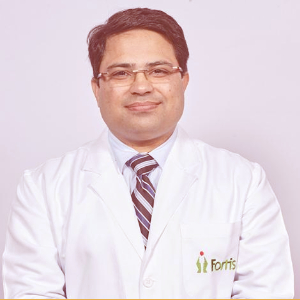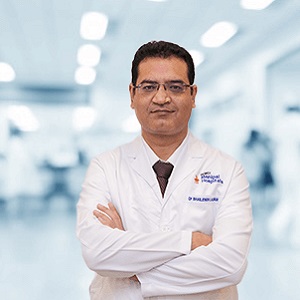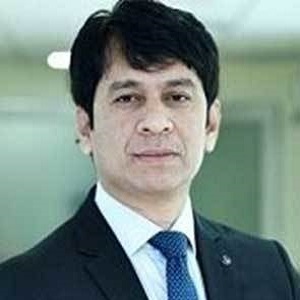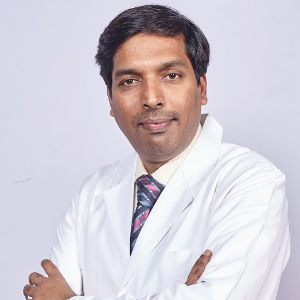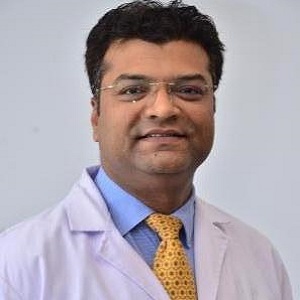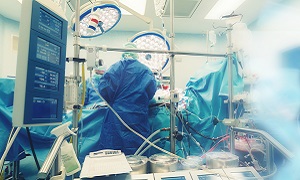Best Doctors in India for Pancreas Transplant
- Top Liver Transplant Surgeon, Biliary Sciences, and Robotic Surgery | Max Hospital, Saket, New Delhi, India
- 34+ Years Experience
- Max Super Specialty Hospital, Saket, New Delhi
Profile Highlights:
- Prof. (Dr.) Subhash Gupta is a pioneering figure in the field of liver transplantation and biliary sciences, currently serving as the Chairman of the Centre for Liver & Biliary Sciences at Max Healthcare.
- Under his leadership, the Centre has emerged as one of the largest liver transplant centers globally, with over 3,000 transplants to its credit.
- Dr. Gupta’s illustrious career spans over three decades, with a focus on Surgical Gastroenterology, Liver Transplantation, and HPB Oncology.
- Liver Transplant Surgeon, Gurugram, India
- 21 + years’ experience
- Medanta-The Medicity, Gurgaon
Profile Highlights:
- As the Chairman of Liver Transplant at Medanta The Medicity, Gurugram, Dr. Soin spearheads India’s largest and most successful liver transplant program. His unparalleled expertise and dedication have led to over 2,500 liver transplants with an impressive 95% success rate, making him a pioneer in his field.
- With a career spanning over 21 years, Dr. Soin has performed more than 12,000 complex surgeries involving the liver, gall bladder, and bile ducts.
- He earned his MBBS and MS (Thesis) degrees, which laid the groundwork for his medical expertise.
- Top Liver Transplant Surgeon and HPB Surgeon | Rela Hospital, Chennai, India
- 30+ Years Experience
- Dr. Rela Institute & Medical Centre
Profile Highlights:
- Dr. (Prof.) Mohamed Rela is known as one of the best liver transplant surgeons in the world. His name has also entered the Guinness Book of Records for performing liver transplantation of a 5-day-old baby.
- With more than 30 years of experience, Dr. Rela is known as a pioneer in liver transplantation & hepatopancreatobiliary (HPB) surgery.
- Dr. Mohamed Rela is the Chairman and Director of Dr. Rela Institute and Medical Centre, Chennai, India; and the Professor of Liver Surgery and Transplantation, at King’s College, Hospital in London as well.
- During his career of almost 30 years, Dr. Rela has performed over 4500 liver transplantations worldwide.
- Liver Transplant & HPB Surgeon, Gurugram, India
- Over 17 years’ experience
- Fortis Memorial Research Institute
Profile Highlights:
- Dr. Vivek Vij is an esteemed leader in liver transplantation and hepatobiliary science, currently serving as the Chairman of Liver Transplant & Hepato-Biliary Science at Fortis Okhla.
- With over 15 years of experience, Dr. Vij is renowned for his expertise in gastroenterology, minimal access surgery, bariatric surgery, and metabolic and bariatric surgery.
- Dr. Vij’s educational qualifications include MBBS, MS, MRCS, and DNB, reflecting his extensive training and dedication to his specialty.
- Liver Transplant & Hepato-Pancreatic Biliary Surgery, New Delhi, India
- 19 + years’ experience
- Manipal Hospitals, New Delhi
Profile Highlights:
- Dr. Shailendra Lalwani is a distinguished leader and innovator in the field of Liver Transplantation and Hepato-Pancreatic-Biliary (HPB) Surgery.
- As the Head of the Department and Consultant for these specialties, Dr. Lalwani brings unparalleled expertise and a wealth of experience to his role, shaping the future of advanced surgical care with precision and compassion.
- Dr. Lalwani’s academic and professional credentials reflect a commitment to excellence and continuous learning. He holds an MBBS, an MS in General Surgery, and a DNB in Surgical Gastroenterology.
- Top Surgical Gastroenterologist, Liver Transplant Surgeon | Apollo Hospital, New Delhi, India
- 15+ Years Experience
- Indraprastha Apollo Hospital, New Delhi
Profile Highlights:
- With over 15 years of dedicated experience in the field, Dr. Neerav Goyal stands out as a leading Liver Transplant Specialist based at Apollo Hospitals Indraprastha, New Delhi.
- His extensive qualifications include MBBS, DNB, and specialized diplomas in General Surgery and Surgical Gastroenterology.
- Dr. Goyal’s expertise spans a wide range of liver-related conditions including Cirrhosis, Hemochromatosis, Hepatitis B, and other complex liver diseases.
- Liver Transplant Surgeon & HPB Surgeon, Gurugram, India
- Over 15 years’ experience
- Artemis Hospital, Gurgaon
Profile Highlights:
- Dr. Giriraj Singh Bora is a liver transplant surgeon, who is known for being the founding member of the Liver Transplant Society of India.
- He is the first doctor to perform a liver transplantation in Rajasthan. He is also known for carrying out the first deceased donor and the first living donor liver transplants in Rajasthan and has also been instrumental in starting a liver transplant program in the region.
- GI Surgeon and Liver Transplant Surgeon, Gurugram, India
- Over 20 years’ experience
- Medanta-The Medicity, Gurgaon
Profile Highlights:
- Dr. Amit Nath Rastogi is a pioneer in the field of liver transplant surgery. He completed his fellowship in liver transplant surgery at Sir Gangaram hospital while being a part of the largest liver transplant program in the country.
- Furthermore, he received his training in robotic liver surgery from IRCAD -Strasbourg, France, and advanced robotic HPB training from Grosseto.
- Liver Transplant & HPB Surgeon, Gurugram, India
- Over 20 years’ experience
- Fortis Memorial Research Institute
Profile Highlights:
- Dr. Ajitabh Srivastava is a reputed HPB and Liver Transplant surgeon in India.
- He has been a key member of teams that performed over 1500 liver transplants including living donors, deceased donors, pediatric transplants, and combined liver and kidney transplants.
- He is an expert in other complex procedures involving hepatobiliary surgery, combined liver, and Kidney Transplant, and vascular access surgery.
- Liver Transplant Surgeon & HPB Surgeon, New Delhi, India
- Over 20 years’ experience
- PSRI Hospital
Profile Highlights:
- Dr. Bhushan Bhole is a well-known Liver Transplant Surgeon & HPB Surgeon who has done Advanced Fellowship in Liver Transplantation & Fellowship in Advanced Laparoscopic Surgery, in Birmingham, UK.
- He is an active member of several national surgical associations such as ASI, IASG, IHPBA, ACRSI, MAS, IAGES, IHA & IMA. He has also been awarded many fellowships like FACRSI, IAGES & FMAS.
Best Hospitals in India for Pancreas Transplant
- City: Gurugram, India
Hospital Highlights:
- One of India’s best and largest multi-specialty hospitals, Medanta was built with the aim to bring India to the highest standards of medical care. The hospital has been providing the best medical services to its patients, since its inception, with care, commitment, and compassion.
- Equipped with 1250 beds, the hospital was founded by Dr. Naresh Trehan in the year 2009 with an aim to provide the best medical care at affordable costs. The hospital is spread across 43 acres and includes 45 operation theatres and 350 beds dedicated solely to ICU. The hospital includes over 800 doctors, and more than 22 specialty departments and has a dedicated floor for individual specialty in order to offer the best services under one roof.
- The hospital is considered one of the premier institutes in India for Cardiac Care and includes staffs and members of high caliber. The hospital has 6 distinct centers of excellence.
- City: Gurugram, India
Hospital Highlights:
- Artemis Hospital, established in 2007 in Gurugram, India, is a leading multi-specialty institution known for its excellence in patient care and advanced medical technology, offering comprehensive services across specialties like Cardiology, Oncology, Neurology, Orthopedics etc.
- Renowned for its patient-focused care, Artemis Hospital combines state-of-the-art infrastructure with a team of internationally trained doctors and surgeons, ensuring the highest standards of medical treatment.
- Accredited by JCI and NABH, Artemis Hospital meets global healthcare quality and safety standards, reflecting its commitment to providing compassionate, personalized care.
- The hospital is recognized for utilizing cutting-edge diagnostic and ther*peutic techniques, ensuring patients receive accurate diagnoses and effective treatments tailored to their needs.
- City: Chennai, India
Hospital Highlights:
- The Apollo Proton Cancer Centre in Chennai is the most sought-after private cancer hospital in India. It is an integrated facility that provides cutting-edge, all inclusive cancer treatment to patients all over the globe.
- The hospital is a part of the renowned Apollo Group which has a large network of over 74 hospitals in India and across the globe. Out of the 74 hospitals, 21 of them are cancer centres. However, Apollo Proton Cancer Centre is the only cancer hospital to have JCI accreditation.
- The Centre, which was established on the principles of excellence and expertise, unites a formidable medical staff led by some of the most illustrious figures in cancer treatment.
- The hospital follows the global ASTRO Model Policy. It is the same global policy which is followed by countries like USA, UK, and Europe.
- Apollo Proton Cancer Centre is among the very few hospitals in India to receive patients from First World countries such as USA, Canada, New Zealand, Australia, Singapore, Thailand, etc.
- Apart from that, it is also the first hospital in Chennai to receive patients from several countries like Uzbekistan, Kazakhstan, Turkmenistan, Georgia, Armenia, Azerbaijan, SAARC countries (Bangladesh, Nepal, Sri Lanka, Maldives, Bhutan, Afghanistan, and Pakistan), South Africa, Turkey, Egypt, etc.
- In fact, there is a dedicated team at the Apollo Proton Cancer Centre that serves only international patients. Thus, on a monthly basis, the Centre receives patients from across 32 countries.
- Moreover, there are certain treatments in Apollo Proton Cancer Centre that are not available in any other centre. APCC addresses all types of possible cancers that are usually not covered by any other centre.
- City: New Delhi, India
Hospital Highlights:
- Over the last 33 years, the Fortis Escorts Heart Institute has set new standards in cardiac treatment with groundbreaking research. It is now known around the world as a centre of expertise for Cardiac Bypass Surgery, Interventional Cardiology, Non-invasive Cardiology, Paediatric Cardiology, and Paediatric Cardiac Surgery.
- The hospital has cutting-edge laboratories that perform a wide range of diagnostic tests in Nuclear Medicine, Radiology, Biochemistry, Haematology, Transfusion Medicine, and Microbiology.
- Fortis Escorts Heart Institute boasts a diverse group of bright and experienced doctors who are backed up by a team of highly qualified, experienced, and devoted support professionals as well as cutting-edge equipment such as the recently installed Dual CT Scan.
- Approximately 200 cardiac doctors and 1600 personnel currently collaborate to manage over 14,500 admissions and 7,200 emergency situations each year. The hospital now has a 310-bed infrastructure, as well as five cath labs and a slew of other world-class amenities.
- City: Gurugram, India
Hospital Highlights:
- Fortis Memorial Research Institute (FMRI) is a premier multi-super-specialty, quaternary care hospital, known for its exceptional international faculty, top-tier clinicians, super-sub-specialists, and specialized nurses, all supported by cutting-edge technology.
- It is the flaship hospital of Fortis Healthcare Limited, part of IHH Healthcare Berhad, a leading integrated healthcare services provider in India. As one of the country’s largest healthcare organizations, Fortis operates 28 healthcare facilities with over 4,500 operational beds (including O&M facilities) and more than 400 diagnostic centers (including joint ventures).
- Recognized as one of the top hospitals in India, FMRI serves as a leading referral center and aspires to be the ‘Mecca of Healthcare’ for India and beyond. Its 11-acre campus is a testament to its commitment to providing world-class healthcare.
- Accredited by JCI and NABH, FMRI is dedicated to maintaining the highest standards of healthcare quality and safety, ensuring that every patient receives the best possible care. The hospital’s reputation is further enhanced by its state-of-the-art facilities and innovative medical practices.
- City: New Delhi, India
Hospital Highlights:
- The Indian Spinal Injuries Center (ISIC), provides state-of-the-art facilities for the management of all types of spinal ailments.
- Staffed with internationally trained, acclaimed, and dedicated spine surgeons, the hospital provides cutting-edge medical & surgical technology. The hospital provides comprehensive management of spinal injury, back pain, spinal deformities, tumors, osteoporosis, etc.
- The hospital performs motion-preserving spine surgeries including disc replacement and dynamic fixation, and minimally invasive spine surgeries such as endoscopic disc excision.
- The orthopedic service of the hospital covers all orthopedic ailments including trauma, joint diseases & replacements, oncology, pediatric orthopedics & upper limb ailment.
- City: Faridabad
Hospital Highlights:
In the sprawling city of Faridabad, where healthcare needs are diverse and ever-evolving, one institution has consistently stood out as a beacon of excellence in the field of medicine—Marengo Asia Hospital. Established with a vision to provide world-class healthcare services to the community it serves, Marengo Asia Hospital has emerged as a trusted name synonymous with quality, compassion, and innovation in healthcare.
- City: New Delhi, India
Hospital Highlights:
- Indraprastha Apollo Hospital is a 700-bedded multispecialty hospital in the heart of the capital of India. It is a part of Apollo Hospital group, one of India’s most reputed healthcare chains. Indraprastha Apollo Hospital has been accredited by Joint Commission International, making it the first internationally accredited hospital in the country in 2005.
- There are 52 specialties in the hospital with one of the best cardiology centers in the country. The hospital is also equipped with State of the art infrastructure facilities with the largest Sleep Lab in Asia and the largest number of ICU bed facilities in India.
- The latest and highly advanced technologies that are installed in the hospital include Da Vinci Robotic Surgery System, PET-MR, PET-CT, Cobalt-based HDR, Brain Lab Navigation System, Tilting MRI, Portable CT scanner, 3 Tesla MRI, 128 Slice CT scanner, DSA Lab, Endosonography, Hyperbaric Chamber and Fibro scan.
- City: New Delhi, India
Hospital Highlights:
- One of the well-regarded providers in India committed to the highest standards of clinical excellence and patient care, Max Super Specialty Hospital is a part of Max Healthcare, which is the second-largest healthcare chain in India. Regarded as one of the most well-regarded healthcare providers in the country, Max Super Specialty Hospital is committed to the highest standards of clinical excellence as well as patient care. The hospital is also equipped with the latest technology as well as cutting-edge research. The hospital is known to deliver and ensure the highest level of patient care.
- The hospital has more than 500 beds and offers treatment for over 35 specialties. The hospital also holds the credit of having installed the first Brain Suite in Asia. This is a highly advanced Neurosurgical machine that allows MRI to be taken while surgery is ongoing.
- Other advanced and latest technologies are also installed in the hospital such as the 1.5 Tesla MRI machine, 64 Slice CT Angiography, 4D ECHO, LINAC, and 3.5T MRI machine.
- City: Kolkata, India
Hospital Highlights:
- Founded in 2017, the HCG EKO Cancer Centre is a committed, all-inclusive cancer care facility in Kolkata.
- The hospital was collaboratively established by India’s leading cancer care provider HCG (HealthCare Global Enterprises Ltd.), and EKO Diagnostic Pvt. Ltd., a top diagnostic and imaging chain in Eastern India.
- With 88 beds, the hospital provides a full spectrum of services including diagnosis, prevention, screening, second opinions, treatment, rehabilitation, follow-up, and palliative care.
- Additionally, the hospital contains a day-care chemotherapy ward, Neutropenic ward, medical ICU, pharmacy, blood bank, and an IPD wing.
- At HCG EKO Cancer Centre Kolkata, a large team of cancer experts with experience in medical oncology, surgical oncology, radiation oncology, hemato oncology, BMT, and nuclear medicine collaborate to offer a variety of treatment options under one roof.
- Furthermore, the hospital is also known for employing the most advanced radiation technology such as, the Radixact, a next-generation TomoTherapy equipment that provides greater radiation delivery precision.
Pancreas Transplant
Pancreas transplant is a surgical procedure where a healthy pancreas is placed from a donor into a person whose pancreas no longer work properly. A pancreas transplant is often performed as a last resort and it has become a key treatment for people suffering from type 1 diabetes. This procedure is also sometimes carried out for people who need insulin therapy and suffer from type 2 diabetes, though this is less common.
The transplant is performed with the aim to restore normal blood glucose levels to your body. The transplanted pancreas can produce insulin for managing blood glucose levels.
This procedure is generally performed for people who are suffering from diabetes. It is generally not used to treat people with other conditions, though it is rarely used to treat certain types of cancer.
Process
A pancreas transplant can help in restoring normal insulin production and improving blood sugar control in people suffering from diabetes. However, it is not considered a standard treatment. In some cases, the side effects of anti-rejection medications can be serious.
Doctors can consider this procedure if their patients suffer from the following conditions:
- Type 1 diabetes that is not controllable with standard treatment
- Consistently poor blood sugar control
- Severe kidney damage
- Frequent insulin reactions
- Type 2 diabetes associated with low insulin resistance as well as low insulin production
Types
A pancreas transplant can be of multiple types:
Pancreas transplant alone- People suffering from diabetes and having early or no kidney disease are generally considered candidates for a pancreas transplant alone. A pancreas transplant surgery involves the placement of a healthy pancreas into a recipient whose pancreas is not functioning properly anymore.
Combined kidney-pancreas transplant- Surgeons are able to perform combined kidney-pancreas transplants for people having diabetes who are also having or are at risk of kidney failure. In such cases, the pancreas transplants are done at the same time as the kidney transplants.
This method can give you a healthy kidney and pancreas, which will most likely not contribute to diabetes-related kidney damage in the future.
Pancreas-after-kidney transplant– For people who are facing a long wait for a donor kidney and a donor pancreas to become available, a kidney transplant might be recommended at first if a living or deceased-donor kidney is available.
After the patient recovers from the kidney transplant surgery, they can later receive a pancreas transplant once a donor pancreas is available.
Pancreatic islet cell transplant- During this method, insulin-producing cells, i.e. islet cells that are taken from a deceased donor’s pancreas, will be injected into a vein that will be taking the blood to your liver. Generally, more than one injection of transplanted islet cells might be required.
Preparation
First, you will receive a medical evaluation at a transplant center before you undergo any kind of organ transplant. This will involve multiple tests, for determining your overall health, which includes a physical exam. Your medical history will be reviewed by a healthcare professional at the transplant center.
Before you undergo a pancreas transplant, there might be specific tests, which include:
- blood tests, such as an HIV test
- kidney function tests
- neuropsychological exams
- a chest X-ray
- studies for checking your heart function, such as an electrocardiogram or an echocardiogram
The evaluation process generally takes a month or two. It is done so that the doctor and healthcare team is able to determine whether you are a suitable candidate for the surgery and whether you will be able to handle the drug regiment which is required post-surgery.
Once it is determined, that you are a suitable candidate, then your name will be placed on the waiting list of the transplant center.
You will need to remember that different transplant centers are likely to have different kinds of preoperative protocols. These will vary further depending on the type of donor as well as the overall health of the recipient.
Procedure
The procedure is performed using general anesthesia and therefore you are unconscious throughout the procedure. The anesthetist can give you medication such as gas for breathing through a mask or may inject a liquid medication directly into one of your veins.
Once you are unconscious, your surgeon will first make an incision down the center of the abdomen. The surgeon will then place the new pancreas, as well as a small portion of the donor’s small intestine into your lower abdomen.
Next, the donor’s intestine is attached either to your small intestine or your bladder and the donor pancreas is then connected to blood vessels that supply blood to your legs. After this, your own pancreas is left in place for aiding digestion.
If you are undergoing a kidney transplant as well, then the blood vessels of the new kidney are attached to blood vessels in your abdomen’s lower part.
The new kidney’s ureter, which is the tube linking the kidney to the bladder, will next be connected to your bladder. Your kidneys are left in place unless they are causing any complications such as high blood pressure or infection.
Throughout the procedure, your blood pressure and blood oxygen will be monitored by the surgical team. The surgery can take around three to six hours. It will depend on whether you are having a pancreas transplant alone or a kidney transplant combined with a pancreas transplant.
After the procedure
Once the transplant surgery is complete, recipients are generally required to stay in the ICU for a few days so that he/she can be monitored for any complications. After this, he/she can move to a transplant recovery unit within the hospital.
Since a pancreas transplant involves various medications, a recipient’s drug therapy can require extensive monitoring, since they will need to take these drugs every day to prevent rejection of the new organ.
After a successful transplant, the new pancreas will be making the insulin required by your body and therefore you will not need insulin therapy to treat type 1 diabetes. However, even with the best possible match between the donor and you, your immune system will be trying to reject your new pancreas. This is why you will need anti-rejection medication so that your immune system can be suppressed. It is likely that these drugs can be required for the rest of your life. Medications that suppress the immune system generally makes your body more vulnerable to infection, and this is why your doctor might also prescribe antibacterial and antifungal medications.
Certain signs and symptoms can indicate your body rejecting your new pancreas:
- Belly pain
- Increased blood sugar levels
- Fever
- Excessive tenderness at the transplant site
- Decreased urination
- Vomiting
You will need to notify your transplant team immediately if you notice any of these symptoms.
Risks
Like any organ transplant, there is the possibility of a rejection of the new organ. It carries the risk of failure of the pancreas as well. Thanks to advancements in surgical and immunosuppressant medication therapy, the risk in this procedure have become low. In rare cases, there is also a risk of death.
The procedure itself carries several risks, such as bleeding, blood clots, as well as an infection. There is also a risk of hyperglycemia, which can occur during and right after the transplant.
The drugs which you will receive after the transplant can also lead to serious side effects. Some of these side effects include:
- high cholesterol
- thinning of the bones
- high blood pressure
- Hyperglycemia
- weight gain
- hair loss or excessive hair growth

